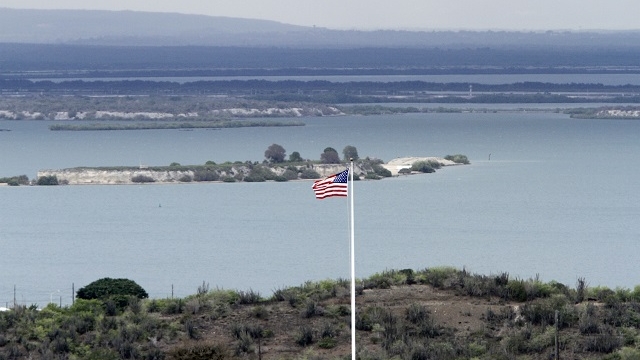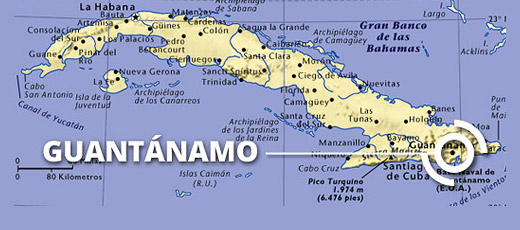
Opinions from Cuba on the return and ‘control’ of Guantánamo
HAVANA — One of the important points in the agenda for the normalization of relations between the United States and Cuba is the return to the island of its sovereignty over the territory occupied by the U.S. Navy base in Guantánamo, on the easternmost tip. The issue, obviously a complex one, has begun to stir key centers of the United States because of their decision-making powers, such as the U.S. Congress.

Nelson P. Valdés, professor emeritus at the University of New Mexico and director of the Cuba-L Project, has made public an item from the House-Senate Conference Report on H.R. 1735, National Defense Authorization Act for Fiscal Year 2016.
Section 1036 of Subtitle D, Title X, reads as follows:
“No amounts authorized to be appropriated by this Act or otherwise available for the Department of Defense may be used, during [fiscal year] 2016, (1) to shut down or abandon the Naval Station of the United States at Guantánamo Bay, Cuba; (2) to cede control of Guantánamo Bay to the Republic of Cuba; or (3) to implement any material modification to the Treaty Between the United States of America and Cuba, signed in Washington, D.C., that will close in a constructive manner the Naval Station of the United States at Guantánamo Bay.”
This item was the first reaction of the legislative power to this issue. For that reason, Progreso Weekly has sought the opinions of several Cuban specialists and academicians.
Dr. Jesús Arboleya, professor of history at the University of Havana, former diplomat and author of numerous books about U.S.-Cuba relations.

The fact that this is the result of a House-Senate Conference Report indicates a consensus that will surely become a legal provision that corresponds with the policy announced by Secretary [of State John] Kerry. So, it is possible to affirm that the President will not veto it.
What summons my attention most strongly is subsection (2) which forbids ceding control of the bay of Guantánamo to the Republic of Cuba. Far as I know, the base occupies only part of that bay and its control is limited to that space.
At various times, the Department of Defense has acknowledged the base’s scant military value and decried the economic burden it represents. Therefore, its permanence is more of a show of political power than a need for the United States’ national security, as they conceive it.
Another value, questionable in many ways from the legal point of view, is that the base has been used as an extraterritorial camp for illegal immigrants. That quality, which enables [the base occupants] not to abide by U.S. law, also determined the installation there of a prison for alleged terrorists. This violates the original 1902 accord with Cuba, which specifies the purposes of its utilization.
[To read the full text of the accord, as signed in 1903, click here.]
For Cuba, the base does not have a special importance from a military point of view. However, it does have a very important symbolic and practical value from the point of view of the defense of national sovereignty. Therefore, the Cuban government will most assuredly continue to insist on the issue, which will remain a topic of dispute between the two countries.

Aurelio Alonso, winner of the 2013 National Award for Social Sciences, deputy editor of the Casa de las Américas magazines, is considered one of the most lucid Cuban intellectuals.
The battle for normalization. That’s what it’s all about. We shouldn’t be surprised by this specificity, which brings up the two positions vis-à-vis the problem. To Washington, it’s a question of defending the pre-1959 normalcy from [presidents] McKinley to Eisenhower. Normalcy included U.S. control over the bay of Guantánamo. At the time, there was no blockade (imposed as a sanction against effective sovereignty), something that they had not anticipated.
But normalcy in U.S.-Cuba relations after 1959 is conceived only from the point of view of sovereignty, and this presupposes the completion of the nation’s territoriality, explicit in the five points that the Cuban government demanded as a condition for the withdrawal of the missiles in the October Crisis, points that were ignored in the negotiation between [Soviet leader Nikita] Khrushchev and [U.S. President John F.] Kennedy.
Cuba’s dissatisfaction with the solution was in no way an emotional reaction. This contentious issue could become now the most difficult point, one that would set back full normalcy a long time.
Regarding the other conditions, the elimination of terrorist actions against Cuba seems obvious. So does the suppression of aggressive radio and television broadcasts. The compensations sought by both parties are negotiable. It is evident that the timetables for advancement [in the negotiations] will not be uniform, but — to Cuba — Guantánamo is not renounceable. Yet, this cannot be accepted as an obstacle, if there is a true willingness to normalize relations.
Jorge Gómez Barata, professor, researcher and journalist, the author of numerous studies on the United States.

By amending H.R. 1735, National Defense Authorization Act for Fiscal Year 2016, to deny funds to abandon the naval base at Guantánamo or cede it to Cuba, the most conservative sectors of the House of Representatives and the Senate, who are opposed to President Obama’s policy toward Cuba, are hedging their bets by prohibiting something that no one has planned to do.
The Obama administration is trying to close the prison established in Guantánamo, not the base, and has stressed that shutting down the base is not on its agenda right now.
In any case, just as occurs with all the other affairs that form the legal conflict with the island, the settlement of Cuba’s just demand for the return of the naval base at Guantánamo will surely be the object of complex and probably lengthy negotiations, about which the U.S. Congress will certainly be informed.
That is, unless President Obama decides to utilize his prerogative as Commander in Chief and orders an evacuation of the base. This reaction by Congress is more a gesture for the bleachers than anything else. In a word, it’s more of the same.
Progreso Weekly authorizes the total or partial reproduction of the articles by our journalists so long as source and author are identified.


